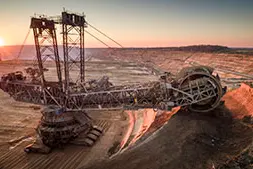PHOTO
The Philippines faces the challenge of attracting investments into the capital-intensive mining sector to play a bigger role in the global clean energy market, while making sure to extract the country's mineral resources in a sustainable and responsible way.
'We would like to attract investments certainly for value-added processing to come into the country so that we will be exporting not just raw ore,'Environment Secretary Maria Antonia Yulo-Loyzaga said.
To support this endeavor, DENR Undersecretary Carlos Primo David said the government needs to lay down policies to unlock the potential of the mining sector.
'One is our strategy to concentrate and bring back government-led exploration. Second is a policy on small-scale mining and the third is on rationalizing the social development and management program (SDMP) of mining companies which is a mandated and direct contribution of mining to communities, unique only to the mining sector,' he said.
SDMP is the five-year plan of mining contractors and permit holders, which contains plans to support the development and empowerment of host and neighboring communities.
The agency is set to push for an extensive government-led exploration of critical minerals this year.
Earlier, the DENR chief said this effort will be augmented by technical support coming from foreign partners including the Australian Government and the US Geological Survey.
Meanwhile, the Mines and Geosciences Bureau (MGB) was directed to promote and enable mineral processing, particularly for laterite deposits; process nickel, and recover other minerals such as iron, cobalt, and rare earth minerals.
These strategies aim to maximize the value of the country's mineral resources, which can be used toward energy transition and economic development and meet global demand for critical minerals in the clean energy shift.
'Nickel is one of those minerals that is directly affected by this move to attract new investments in processing. But we really need to keep in mind that minerals are essential for energy transition to happen,' Loyzaga said.
To attract the necessary investments into the sector, the mining industry has been urging the government to streamline the permitting process through a one-stop shop.
And this is something the DENR is currently working on to shorten the permitting process, according to the environment chief.
'There are two things we're trying to do now at the MGB. The first would be the digitization of the data that is related to our mining mineral resources. There is a second phase to that (which is)the digitalization of processes,' Loyzaga said.
'Once we're at a point where we can digitalize, we will be able to serve this particular request and that will also be our desire, to streamline the process so there can be efficiency related to investment,' she said.
Earlier, the Philippine Nickel Industry Association (PNIA) - the country's largest umbrella group of nickel producers - said the one-stop shop should significantly reduce processing time of permits to just six months to one year, from the current five to 10 years.
Another major thrust of the DENR in the mining sector is engaging the private and public sectors to ensure extracting mineral resources will be done in a sustainable and responsible manner.
Copyright © 2022 PhilSTAR Daily, Inc Provided by SyndiGate Media Inc. (Syndigate.info).
The Philippine STAR





















